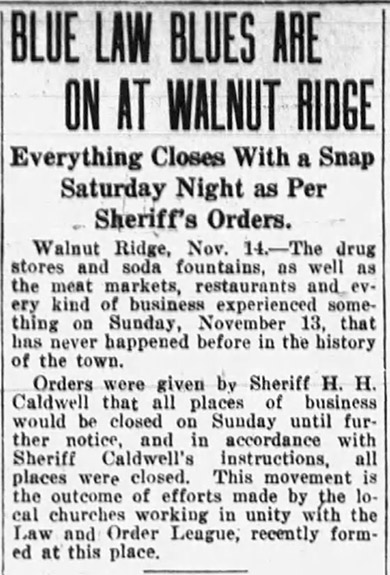By Dr. Curtis Varnell
During my childhood, on a Sunday, one could travel through the entire town where I lived and not see a light on in any business. Not a car lined the courthouse square, not a restaurant was open, and, if you needed gasoline you would have to wait until after 12 o’clock and church was over. Blue laws restricting trade were in effect all-over Arkansas and were very prevalent in the smaller towns.
Blue laws essentially evolved from religious efforts to enforce Sunday as a day of relaxation and rest for all. The laws were and, in many cases still are, prevalent in many European countries and were brought over and enforced with the earliest colonists. Nearly every state originally had blue laws but they were phased out in many states with the South being the longest hold-out on extinguishing them.


In 1837, immediately after statehood, Arkansas enacted a series of blue-laws. The laws prohibited all sales on Sunday and the only labor allowed was acts of daily necessity like feeding livestock or collecting eggs. No stores opened, no farming was done, no long-distance travel was allowed. To get around the First Amendment, non-Christians were allowed to open a store on Sunday if they closed it one other day of the week.
By the 1850’s these laws included bans on playing cards, horse racing, and even playing baseball games. In 1885, Arkansas attempted to close the loop-hole allowing people to exchange opening Sundays for other days. The case resulted from efforts to prevent Seventh Days Advents living in northwest Arkansas from farming on Sundays. Senator Tillman, the author of the bill stated, “the first day of the week is the Christian Sabbath and —-should be respected as such. What effect would it have on a child to pass, on the way to Sunday school, people plowing or reaping in the fields when you are trying to bring them up in the way they should go?” His bill passed the senate with a vote of 16-11.
After WWII, objections to the blue laws resulted in the 1961 Supreme Court ruling that state legislatures could enact prohibitions as long as they did not advance any faith and that they were geared toward providing healthy lifestyle for citizens. The resulting conflagration resulted in a hodge-podge of excessive and often contradictory laws throughout the U.S. In Texas you could buy beer on Sundays but no baby diapers, in Louisiana you could buy a home but no furniture, and in Arkansas you could buy no clothing, house wares, building materials, and certainly no dancing or alcohol was allowed. These laws continued in effect throughout the 1960’s and 70’s but enforcement varied from community to community. Some stores were allowed to open on Sundays’ but aisles with items not deemed suitable for Sunday sales were marked off or closed. Opening and closing times were set arbitrarily with some communities gaining unfair marketing advantages. In 1982, the Arkansas Supreme court struck down many of the requirements of the Blue Sunday laws but local communities and customs still dictate much of the market. In recent years, liquor sales have been the most contentious item with restricted markets. The most recent check indicated that Arkansas had 39 of Arkansas’s 75 counties were dry and prohibit alcohol sales altogether. Most counties prohibit or limit Sunday sales and sales on holidays but many businesses have found ways to get around the regulations. Some stores, often within blocks of each other, have diverse and conflicting rules.
I grew up during the peak enforcement of these laws. I had little difficulty with most of the blue laws. My grandmother cooked a family meal for the entire clan, our church was right down the road so we didn’t need to buy fuel, and I didn’t drink or dance. I did have difficulty following our local ban on sports and Sunday entertainment. Most Sunday afternoons I would elope with my father to go watch Scranton play baseball and, if that wasn’t available, sneak to the half-bushel swimming hole on Shoal Creek to swim!






